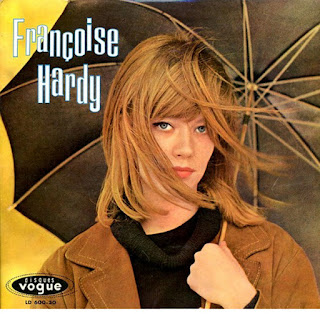When France rocked around the clock...
The first rock 'n' roll song to make the French charts was, unsurpisingly enough, Bill Haley's "Rock Around The Clock". As elsewhere, it was buoyed by the success of the film "Blackboard Jungle" (titled "Graine de violence" for French consumption), making the top ten best-selling list in "Music Hall" magazine in early 1956. Although French singers and musicians had been covering rhythm'n'blues hits for a couple of years (notably Line Renaud's take on LaVern Baker's "Tweedlee Dee"), the sound of Haley's record still came as a revelation to French audiences, especially when heard blasting out of a cinema screen.
As was customary at the time, the French record industry responded to Haley's hit (it peaked at #4 in the spring) by rushing out a host of cover versions, with each label pressing one or more of the house artistes to add the song to their repertoires in an effort to siphon off some of Haley's sales. First to market was veteran bandleader Jacques Hélian (only the second French performer to sell a million records - Tino Rossi being the first), whose orchestra had long perfected the art of laying down dancefloor friendly renditions of the hits of the day. On this occasion though, it came complete with a vibraphone solo and ... well, at least he was the first...
Along the way, the song picked up a French title, "Toutes les heures qui sonnent", although Hélian's record does not carry a credit for the French lyricist. The same title was used for an EP release by jazzman Hubert Rostaing (who also recorded rock'n'roll as Earl Cadillac), this time with a lyrical credit for Jacques Larue, whose long list of credits included songs for Maurice Chevalier, Léo Marjane, André Claveau and Édith Piaf - it would be reasonable to assume that rock'n'roll was something of a departure for him.
For some reason, jazzmen seem to have been drawn to the song like moths to a flame. Trombonist Benny Vasseur recorded a version under the pseudonym Benny Rock, harmonica player Albert Raisner laid down a version with his trio that sounds much as might be expected while Peb Roc (who he?) gave the world a big band rendition fronted by vocalists Christiane Legrand and Jeannine Wells. The big beat was in place, but as for the swinging sound of the Comets... oh well...
The first vocalists to tackle the Haley songbook were Les Bingsters, an Andrews Sisters-type outfit for whom rock'n'roll was always going to be a step too far out of their comfort zone. They tried their best with it, but really, they were better off sticking to the likes of the Commanders' "Elephant Tango" ("Le tango de l'éléphant"), which rather better suited their style.
Haley aside, France wouldn't really start to grips with rock'n'roll until 1958, when the success of Paul Anka and the Platters kickstarted a wave of interest. By 1960 this would lead to the commercial breakthrough of Johnny Hallyday, by which time Haley's joyous sound would be replaced by something harder and more exciting. The early attempts at giving a French spin to the sound that swept Haley to stardom across the globe were largely forgotten for decades, remembered only by intrepid rock'n'roll fanatics who kept the flame alive until the reissue industry of the 21st century shone a light into this dark, dusty corner of French pop history.





Michel Legrand's take on the song has enough of a gutsy feel for the song, while still giving it a rather smooth Legrand-touch. How interesting.
ReplyDeleteAh oui, Legrand's is the best of the French versions, with a nice, big, thumping beat. It certainly is a long way from "Yentl" or "The Windmills Of Your Mind" but it still has a Legrand feel in the arrangement.
Delete